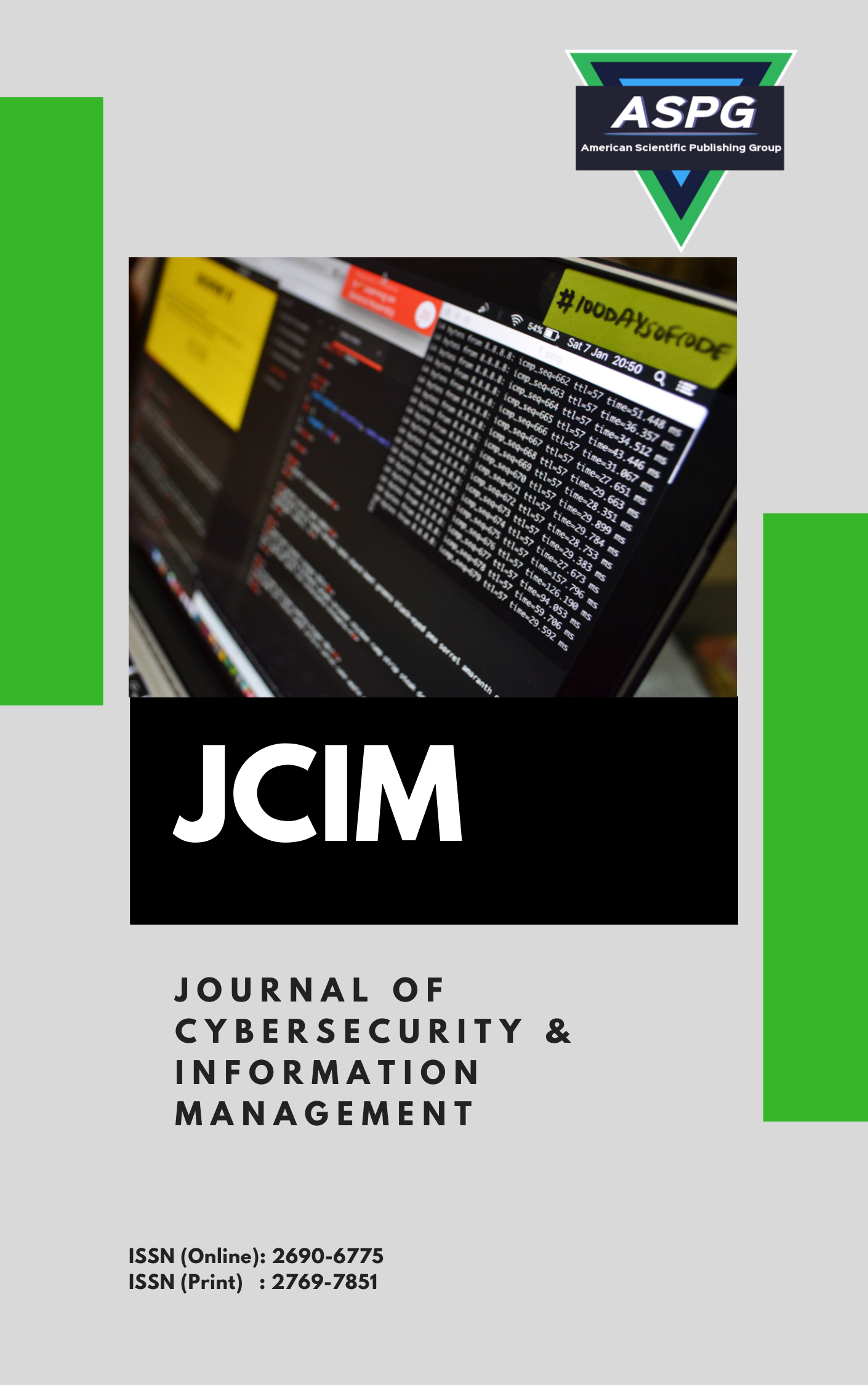

Volume 14 , Issue 2 , PP: 300-310, 2024 | Cite this article as | XML | Html | PDF | Full Length Article
M. Revathi 1 * , Devi .D 2 , R. Menaha 3 , R. Dineshkumar 4 , S. Mohan 5
Doi: https://doi.org/10.54216/JCIM.140221
By splitting a picture into many parts, which, when reassembled, disclose the original image without requiring complicated math, visual cryptography is a strong method for protecting visual information. Problems with pixel enlargement, decreased picture quality, and restricted access structures are common with traditional visual cryptography techniques. Our proposed improved visual cryptography approach incorporates pixel-wise operations and critical access structures to solve these challenges and increase flexibility, picture quality, and security. To reconstruct a picture, our technique calls for building visual cryptographic shares based on critical access structures that specify the exact combinations of shares needed. In order to maintain the image's resolution and reduce pixel expansion, we use pixel-wise processes. By improving the peak signal-to-noise ratio (PSNR) by up to 20% compared to conventional approaches, experimental data show that our strategy greatly improves picture quality. In addition, the suggested approach guarantees that individual shares do not disclose any information on the original picture, thereby maintaining high security requirements. Finally, it is clear that the enhanced visual cryptographic system is well-suited for a wide range of uses in safe communications and data security due to its strong solution for secure picture sharing, increased picture quality, and adjustable access control.
Visual Cryptography , Image Security , Pixel-Wise Operations , Access Structures , Image Quality , Secure Image Sharin , Data Protection , Peak Signal-to-Noise Ratio (PSNR) , Visual Cryptographic Shares , Information Security
[1] Lee, K. H., & Chiu, P. L. (2011). An extended visual cryptography algorithm for general access structures. IEEE transactions on information forensics and security, 7(1), 219-229.
[2] Wang, Y., Chen, J., & Wang, J. (2023). Visually meaningful image encryption based on 2D compressive sensing and dynamic embedding. Journal of Information Security and Applications, 78, 103613.
[3] Zhang, F., Guo, Y., Pu, M., Chen, L., Xu, M., Liao, M., ... & Luo, X. (2023). Meta-optics empowered vector visual cryptography for high security and rapid decryption. Nature Communications, 14(1), 1946.
[4] Gupta, S., Nitish, Harish, M., & Sharma, A. K. (2024). A hybrid authenticated image encryption scheme using elliptic curves for enhanced security. International Journal of Information Technology, 1-18.
[5] Qi, Z., MaungMaung, A., & Kiya, H. (2023). Privacy-Preserving Image Classification Using ConvMixer with Adaptative Permutation Matrix and Block-Wise Scrambled Image Encryption. Journal of Imaging, 9(4), 85.
[6] Renuka Devi, K., Nithyapriya, S., Pradeep, G., Menaha, R., & Suganyadevi, S. (2023). Securing Shared Data Based on Homomorphic Encryption Schemes. In Homomorphic Encryption for Financial Cryptography: Recent Inventions and Challenges (pp. 53-83). Cham: Springer International Publishing.
[7] Maity, K., & Mukhopadhyay, S. (2023). VSBSIS: A verifiable SVD-based secret image sharing scheme for lossless and efficient reconstruction. Displays, 78, 102455.
[8] Gao, K., Chang, C. C., & Lin, C. C. (2023). Cryptanalysis of Reversible Data Hiding in Encrypted Images Based on the VQ Attack. Symmetry, 15(1), 189.
[9] Heednacram, A., & Keaomanee, Y. (2024). Four enhanced algorithms for full size image hiding in chest x-ray images. Multimedia Tools and Applications, 1-27.
[10] Sharma, P. L., Gupta, S., Nayyar, A., Harish, M., Gupta, K., & Sharma, A. K. (2024). ECC based novel color image encryption methodology using primitive polynomial. Multimedia Tools and Applications, 1-40.
[11] Wu, X., Wong, D. S., & Li, Q. (2009). Threshold visual cryptography scheme for color images with no pixel expansion. In Proceedings of the Second Symposium International Computer Science and Computation Technology (pp. 310-315).
[12] Liu, B., Martin, R. R., Huang, J. W., & Hu, S. M. (2014, October). Structure aware visual cryptography. In Computer Graphics Forum (Vol. 33, No. 7, pp. 141-150).
[13] Shivani, S., & Agarwal, S. (2018). VPVC: verifiable progressive visual cryptography. Pattern Analysis and Applications, 21(1), 139-166.
[14] Wang, L., Yan, B., Yang, H. M., & Pan, J. S. (2020). Flip extended visual cryptography for gray-scale and color cover images. Symmetry, 13(1), 65.
[15] P. Radanliev, D. De Roure, and O. Santos, "Red Teaming Generative AI/NLP, the BB84 Quantum Cryptography Protocol and the NIST-Approved Quantum-Resistant Cryptographic Algorithms," arXiv preprint arXiv:2310.04425, 2022. [Online]. Available: https://arxiv.org/abs/2310.04425.
[16] B. Yu, J. Yuan, and L. Fang, "A Co-cheating Prevention Visual Cryptography Scheme," Proceedings of the Third International Conference on Information and Computing, 2010, pp. 42-46. DOI: 10.1109/ICIC.2010.55.
[17] Soman, N., & Baby, S. (2016). XOR-Based Visual Cryptography. Int. J. Cybern. Informatics, 5(2), 253-264.
[18] S. M. Qader, B. A. Hassan, and T. A. Rashid, "An Improved Deep Convolutional Neural Network by Using Hybrid Optimization Algorithms to Detect and Classify Brain Tumor Using Augmented MRI Images," Computers, Materials & Continua, vol. 70, no. 2, pp. 1991-2008, 2022. DOI: https://doi.org/10.32604/cmc.2022.021907.
[19] M. Suriya, E. Anitha, N. Sudarssan, A. Venu Venkat, V. S. Deepak Saran and K. Kunguma Sakthivel, "An Efficient Artificial Intelligence based Human-Machine Interaction System," 2023 9th International Conference on Advanced Computing and Communication Systems (ICACCS), Coimbatore, India, 2023, pp. 2067-2071, doi: 10.1109/ICACCS57279.2023.10112925.
[20] Haldorai, A., Murugan, S., & Balakrishnan, M. (2024). Bi-Model Emotional AI for Audio-Visual Human Emotion Detection Using Hybrid Deep Learning Model. In Artificial Intelligence for Sustainable Development (pp. 293-315). Cham: Springer Nature Switzerland.